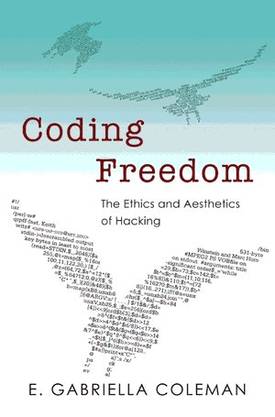
Biella Coleman is a geek anthropologist, in both senses of the epithet: an anthropologist who studies geeks, and a geek who is an anthropologist. Though she's best known today for her excellent and insightful work on the mechanism and structure underpinning Anonymous and /b/, Coleman is also an expert on the organization, structure, philosophy and struggles of the free software/open source movements. I met Biella while she was doing fieldwork as an intern at the Electronic Frontier Foundation. She's also had deep experience with the Debian project and many other hacker/FLOSS subcultures.
Coleman's has published her dissertation, edited and streamlined, under the title of Coding Freedom: The Ethics and Aesthetics of Hacking, which comes out today from Princeton University Press (Quinn Norton, also well known for her Wired reporting on Anonymous and Occupy, had a hand in the editing). Coding Freedom walks the fine line between popular accessibility and scholarly rigor, and does a very good job of expressing complex ideas without (too much) academic jargon.
Coding Freedom is insightful and fascinating, a superbly observed picture of the motives, divisions and history of the free software and software freedom world. As someone embedded in both those worlds, I found myself surprised by connections I'd never made on my own, but which seemed perfectly right and obvious in hindsight. Coleman's work pulls together a million IRC conversations and mailing list threads and wikiwars and gets to their foundations, the deep discussion evolving through the world of free/open source software.





